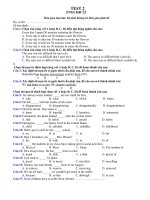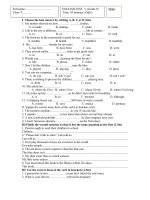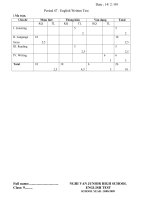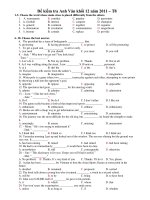de kiem tra Anh 12 Unit 123
Bạn đang xem bản rút gọn của tài liệu. Xem và tải ngay bản đầy đủ của tài liệu tại đây (112.59 KB, 4 trang )
<span class='text_page_counter'>(1)</span><div class='page_container' data-page=1>
<b>Mỹ Quí High School</b>
<b>ONE – PERIOD TEST </b>
<b> </b>
<i><b>English 12 (lần 1 HKI)</b></i>
<b>Name: ______________________________ Đề: 357</b>
<b>Class</b>
: ___________1 2 3 4 5 6 7 8 9 10 11 12 13 14 15 16 17 18 19 20
21 22 23 24 25 26 27 28 29 30 31 32 33 34 35 36 37 38 39 40
<i><b>Choose the answer that has the closest meaning as the original one.</b></i>
<b>Câu 1: People think that he was born in a rich family.</b>
<b>A. </b>He was thought to be born in a rich family.
<b>B. </b>That is thought he was born in a rich family.
<b>C. </b>That he was born in a rich family is thought.
<b>D. </b>He is thought to have been born in a rich family.
<b>Câu 2: “Why don’t you ask your boss for a pay raise?”, he asked me.</b>
<b>A. </b>He asked me why I don’t ask my boss for a raise.
<b>B. </b>He advised me to ask my boss for a pay raise.
<b>C. </b>He suggested me to ask for my boss for a pay raise.
<b>D. </b>He offered me asking my boss for a pay raise.
<b>Choose the answer that has different stressed syllable or pronunciation from the rest.</b>
<b>Câu 3:A. </b>mis<b>ch</b>ievous <b>B. </b>te<b>ch</b>nology <b>C. ch</b>ores <b>D. ch</b>ance
<b>Câu 4: A. </b>bi<b>o</b>logist <b>B. </b>c<b>o</b>nfidence <b>C. o</b>bedient <b>D. </b>resp<b>o</b>nsible
<b>Câu 5: A. </b>cou<b>gh</b> <b>B. </b>lau<b>gh</b> <b>C. </b>rou<b>gh</b> <b>D. </b>althou<b>gh</b>
<b>Câu 6: A. </b>intention <b>B. </b>impolite <b>C. </b>important <b>D. </b>informal
<b>Câu 7: A. </b>topic<b>s</b> <b>B. </b>orange<b>s</b> <b>C. </b>sentence<b>s</b> <b>D. </b>house<b>s</b>
<b>Speaking</b>: <i><b>Choose the best answer to make a meaningful dialogue</b></i>:
<b>Câu 8:</b> – Peter: “We haven’t been to a birthday party for ages.”
_ Daisy: “ _______________.”
<b>A. </b>So have I <b>B. </b>Neither do I <b>C. </b>Neither have I <b>D. </b>So do I
<b>Câu 9:</b> – Tony: “ I think married women should not go to work.”
- Babara: “____________.”
<b>A. </b>I’m happy you like it <b>B. </b>I quite disagree with you
<b>C. </b>It’s nice talking to you <b>D. </b>That’s my pleasure
<b>Câu 10:</b> – Lan: “That’s a nice present.”
_ Minh: “________________.”
<b>A. </b>Thank you. See you soon <b>B. </b>Thank you
<b>C. </b>How do you do <b>D. </b>I can’t buy it for you
<b>Câu 11: </b>– Tam: “Let’s go to the cinema tonight, shall we?”
- Mai: “ _______________.”
<b>A. </b>I’m fine <b>B. </b>It’s my pleasure
</div>
<span class='text_page_counter'>(2)</span><div class='page_container' data-page=2>
<b>Find an error in each sentence:</b>
<b>Câu 12:</b> The children looked happily as their mother was coming home from work.
A B C D
<b>Câu 13: </b>
Mr Tam will be divided the class into 2 sections to prevent overcrowding in his classroom.
A B C D
<b>Câu 14:</b> Mr Jones is an experienced teacher who has been in this school since thirty years.
A B C D
<b>Câu 15:</b> As she had a bit of a cold, Jill didn’t feel like come to the class party.
A B C D
<b>Reading</b>: <i><b>Read the passage and choose the correct answer from 16 to 20:</b></i>
If you (16)_____ to someone’s house in America for dinner, you should bring a gift, such
as a bunch of flowers or a box of chocolates. (17)_____ you give your host a wrapped gift, he
may open it in (18)_____ of you. Opening a present in front of a gift-giver is considered
polite. It shows that the host is excited about receiving the gift and wants to show his
appreciation to you immediately. Even if the host (19)_____ it, he will tell a white lie and say
how much he likes the gift to prevent the guest from feeling bad.
If your host (20)_____ you to arrive at a particular time, you should not arrive exactly
on time or earlier than the expected time because this is considered to be potentially
inconvenient and therefore rude, as the host may not be ready.
<b>Câu 16:</b> A. have invited B. are invited C. invite D. invited
<b>Câu 17:</b> A. If B. While C. Because D. Before
<b>Câu 18:</b> A. spite B. stead C. case D. front
<b>Câu 19:</b> A. likes B. doesn’t like C. is like D. isn’t like
<b>Câu 20:</b> A. lets B. makes C. invited D. asks
<b>Choose the best asnwer to complete the sentence:</b>
<b>Câu 21:</b> Yesterday, Mai met a friend, saw a movie, and ___________ home late.
<b>A. </b>coming <b>B. </b>comes <b>C. </b>has come <b>D. </b>came
<b>Câu 22: </b>If your hiccup don’t stop, why don’t you try __________ a glass of water?
<b>A. </b>drink <b>B. </b>to drink <b>C. </b>drinking <b>D. </b>you drink
<b>Câu 23:</b> If I had a map, I ________ you to show me the way to the market.
<b>A. </b>had asked <b>B. </b>didn’t ask <b>C. </b>wasn’t asking <b>D. </b>wouldn’t ask
<b>Câu 24:</b> Pay attention _________ all traffic signs when you are travelling in the street.
<b>A. </b>for <b>B. </b>to <b>C. </b>on <b>D. </b>from
<b>Câu 25:</b> They asked me __________ in Los Angeles then.
<b>A. </b>whether my father had been working <b>B. </b>if my father was working
<b>C. </b>whether was my father <b>D. </b>was my father working
<b>Câu 26:</b> What could be more __________ than a wedding on an island?
<b>A. </b>romanticism <b>B. </b>romanticizing <b>C. </b>romantic <b>D. </b>romance
<b>Câu 27:</b> We can _______ not only through words but also through body language.
<b>A. </b>communicate <b>B. </b>transfer <b>C. </b>talk <b>D. </b>interpret
<b>Câu 28:</b> I feel tired. I __________ in the garden for 2 hours.
</div>
<span class='text_page_counter'>(3)</span><div class='page_container' data-page=3>
<b>Câu 29:</b> I regret ________ to my father’s advice. He was right.
<b>A. </b>not to have listened <b>B. </b>not listening
<b>C. </b>not to listen <b>D. </b>listening not
<b>Câu 30:</b> Dad is always willing ________ a hand _______ cleaning the house.
<b>A. </b>to change / in <b>B. </b>to help / in <b>C. </b>to give / with <b>D. </b>to join / with
<b>Câu 31:</b> We object __________ your leaving dinner table to take calls.
<b>A. </b>for <b>B. </b>to <b>C. </b>with <b>D. </b>on
<b>Choose the best answer to make the sentence meaningful:</b>
<b>Câu 32:</b> Thousands of people are reported _________________.
<b>A. </b>that have lost their homes after the flood
<b>B. </b>to have lost their homes after the flood
<b>C. </b>having lost their homes after the flood
<b>D. </b>to having lost their homes after the flood
<b>Câu 33:</b> I wouldn’t have to take this course ______________.
<b>A. </b>unless my English is better <b>B. </b>if I can speak better English
<b>C. </b>if my English were better <b>D. </b>unless I didn’t speak English better
<b>Câu 34: </b>Owen told me he _____________.
<b>A. </b>already finishes <b>B. </b>is already finished
<b>C. </b>had already finished his project <b>D. </b>has already finished his project
<b>Câu 35:</b> It’s many years ________________.
<b>A. </b>that they were on holiday together <b>B. </b>since they went on holiday together
<b>C. </b>until they went on holiday together <b>D. </b>when they have gone on holiday together
<b>Reading</b>: <i><b>Read the passage and choose the correct answer from 36 to 40:</b></i>
Don’t be surprised if people you don’t know well ask you how much you earn and how
much your car costs. This is quite normal in Singapore. If you are invited for a meal, people
will always offer you a second helping. You should always say “No”, so as not appear
greedy. This will be understood and your host will give you more anyway.
In Britain, it is impolite to ask someone about money or age. However, if you arrange
to meet someone, try not to be more than a few minutes late. On trains, people tend to sit in
silence and read. If you try to start a conversation with the person next to you, don’t be
surprised if you don’t get much of a response.
In Thailand, it is quite normal to visit people at home without being invited. It is rude
to point at people with your finger but do it by nodding your head instead. The head is
considered the most spiritual part of the body and the feet the dirtiest part. So never put your
feet up on a chair or a desk.
<b>Câu 36:</b> . <i>According to the passage, in which country it is not impolite to ask about soeone’s</i>
<i>salary or wages?</i>
<b>A. </b>all are correct <b>B. </b>Singapore <b>C. </b>Britain <b>D. </b>Thailand
<b>Câu 37:</b> . <i>As a guest for dinner, you may want to have more food but it is better to refuse</i>
<i>when offered?</i>
<b>A. </b>say “Yes, please.” <b>B. </b>say “No, thanks”
<b>C. </b>say “ You’re welcome.” <b>D. </b>say “I’d love to”
<b>Câu 38:</b> . <i>Punctually is important here</i>.<i> </i>
<b>A. </b>Not mentioned in the passage. <b>B. </b>in Singapore
</div>
<span class='text_page_counter'>(4)</span><div class='page_container' data-page=4>
<b>Câu 39:</b> . <i>In Britain, people tend to keep their privacy</i> ______________.
<b>A. </b>at home <b>B. </b>when travelling to work
<b>C. </b>on trains <b>D. </b>in a car
<b>Câu 40:</b> . <i>The Thai considered the head the most spiritual part of the body</i> .
<b>A. </b>the highest <b>B. </b>the most attractive
<b>C. </b>the most respectable <b>D. </b>the most admirable
</div>
<!--links-->









